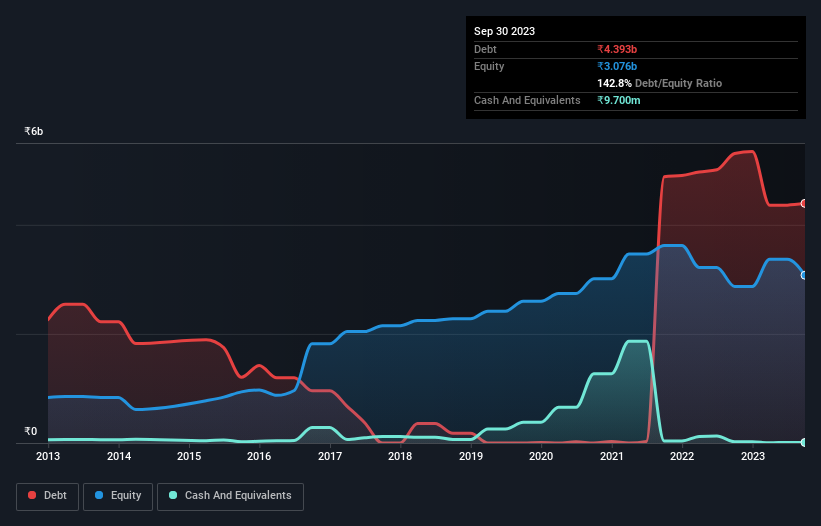Howard Marks put it nicely when he said that, rather than worrying about share price volatility, 'The possibility of permanent loss is the risk I worry about... and every practical investor I know worries about.' When we think about how risky a company is, we always like to look at its use of debt, since debt overload can lead to ruin. We note that Anjani Portland Cement Limited (NSE:APCL) does have debt on its balance sheet. But is this debt a concern to shareholders?
What Risk Does Debt Bring?
Debt and other liabilities become risky for a business when it cannot easily fulfill those obligations, either with free cash flow or by raising capital at an attractive price. Ultimately, if the company can't fulfill its legal obligations to repay debt, shareholders could walk away with nothing. However, a more common (but still painful) scenario is that it has to raise new equity capital at a low price, thus permanently diluting shareholders. By replacing dilution, though, debt can be an extremely good tool for businesses that need capital to invest in growth at high rates of return. The first step when considering a company's debt levels is to consider its cash and debt together.
Check out our latest analysis for Anjani Portland Cement
How Much Debt Does Anjani Portland Cement Carry?
The image below, which you can click on for greater detail, shows that Anjani Portland Cement had debt of ₹4.39b at the end of September 2023, a reduction from ₹5.31b over a year. Net debt is about the same, since the it doesn't have much cash.

How Strong Is Anjani Portland Cement's Balance Sheet?
We can see from the most recent balance sheet that Anjani Portland Cement had liabilities of ₹2.06b falling due within a year, and liabilities of ₹5.11b due beyond that. On the other hand, it had cash of ₹9.70m and ₹546.7m worth of receivables due within a year. So its liabilities outweigh the sum of its cash and (near-term) receivables by ₹6.62b.
Given this deficit is actually higher than the company's market capitalization of ₹5.69b, we think shareholders really should watch Anjani Portland Cement's debt levels, like a parent watching their child ride a bike for the first time. Hypothetically, extremely heavy dilution would be required if the company were forced to pay down its liabilities by raising capital at the current share price. When analysing debt levels, the balance sheet is the obvious place to start. But it is Anjani Portland Cement's earnings that will influence how the balance sheet holds up in the future. So when considering debt, it's definitely worth looking at the earnings trend. Click here for an interactive snapshot.
In the last year Anjani Portland Cement had a loss before interest and tax, and actually shrunk its revenue by 29%, to ₹5.8b. That makes us nervous, to say the least.
Caveat Emptor
While Anjani Portland Cement's falling revenue is about as heartwarming as a wet blanket, arguably its earnings before interest and tax (EBIT) loss is even less appealing. Indeed, it lost ₹349m at the EBIT level. Considering that alongside the liabilities mentioned above make us nervous about the company. It would need to improve its operations quickly for us to be interested in it. It's fair to say the loss of ₹596m didn't encourage us either; we'd like to see a profit. In the meantime, we consider the stock to be risky. There's no doubt that we learn most about debt from the balance sheet. But ultimately, every company can contain risks that exist outside of the balance sheet. For instance, we've identified 5 warning signs for Anjani Portland Cement (2 are concerning) you should be aware of.
If, after all that, you're more interested in a fast growing company with a rock-solid balance sheet, then check out our list of net cash growth stocks without delay.
New: Manage All Your Stock Portfolios in One Place
We've created the ultimate portfolio companion for stock investors, and it's free.
• Connect an unlimited number of Portfolios and see your total in one currency
• Be alerted to new Warning Signs or Risks via email or mobile
• Track the Fair Value of your stocks
Have feedback on this article? Concerned about the content? Get in touch with us directly. Alternatively, email editorial-team (at) simplywallst.com.
This article by Simply Wall St is general in nature. We provide commentary based on historical data and analyst forecasts only using an unbiased methodology and our articles are not intended to be financial advice. It does not constitute a recommendation to buy or sell any stock, and does not take account of your objectives, or your financial situation. We aim to bring you long-term focused analysis driven by fundamental data. Note that our analysis may not factor in the latest price-sensitive company announcements or qualitative material. Simply Wall St has no position in any stocks mentioned.
About NSEI:APCL
Low risk and slightly overvalued.
Similar Companies
Market Insights
Community Narratives



